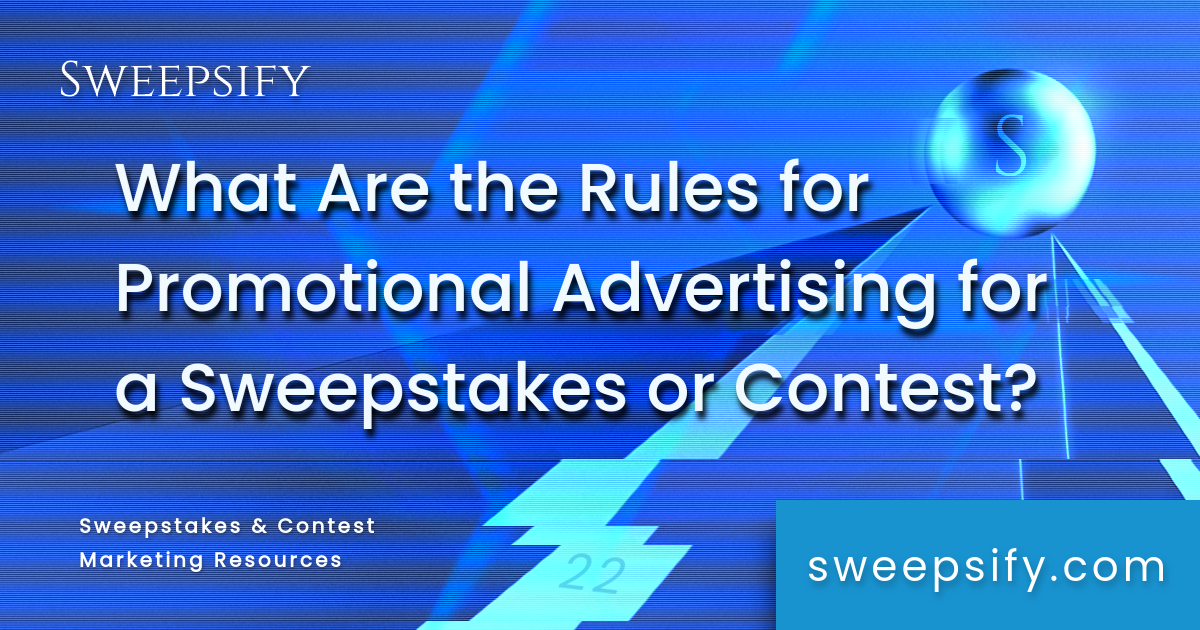Here is a list of our current affiliate partners and how we earn money
Promotional advertising laws apply to sweepstakes, contests, and other types of prize promotions. It’s essential for a legally-compliant giveaway to have a full review by an attorney who is familiar with all aspects of federal and state advertising laws. A sweepstakes administrator from a sweepstakes company can guide you on the best practices for promotional advertising compliance.

How Do Promotional Advertising Rules Apply to Contests and Giveaways?
To help you understand how advertising laws apply to your sweepstakes or contest, this article explains the general requirements for contests, including a set of official rules. The material terms and conditions that govern your promotion, including abbreviated rules, disclosures, and drafting items to review that apply to promotions managed by professional administrators at sweepstakes and contest companies.
Let’s get started!
Article Contents
IN THIS ARTICLE:
- Are sweepstakes and contests regulated?
- How do I host a legal sweepstakes?
- What are promotional advertising laws?
via GIPHY
Which Giveaway Promotions Require Advertising Law Compliance?
Here are the types of giveaway promotions that must comply with advertising laws:
- Sweepstakes
- Contests
- Instant win games
- Spin-to-win games
- Social media contests
- Internet games
- Refer-a-friend promotion
- Retail and ecommerce programs
- Viral campaigns
- Chance vs. skill analysis
- SMS sweepstakes and contest
- Mobile marketing programs
- Coupons and discount promotions
- Rebate programs
- Premium offers
- Gift card giveaways
- On-pack and in-pack games
- Incentive programs
- Freebies
- Sports and event marketing campaigns
- Telecommunication marketing campaigns
- Real-time marketing campaigns
- Mail or Telephone order
- Loyalty programs
- Subscription-based businesses
This is not intended to be a comprehensive list of all of the types of advertising promotions and advertising materials that must comply with advertising laws. Raffles where you must pay money in order to participate are legal only if they are conducted by a registered nonprofit organization with the Attorney Generals Offices. Raffles are also not permitted in some jurisdictions.
All advertising copy, whether for television, radio, print, social media, native advertising, paid advertising or other promotional media should be reviewed by an attorney. One-size-fits-all official rules and contest rules templates do not provide adequate coverage. As a result, it’s best that you have a sweepstakes administrator and/or sweepstakes or contest attorney review your Official Rules before your promotion goes live.
via GIPHY
Where Do Advertising Rules for Sweepstakes and Contests Come From?
The advertising rules apply to all promotions in order to determine what is acceptable for brands to say and not say in ads. There are a myriad of applicable state and federal laws that may apply to your promotion especially if you are running a multi-state sweepstakes or contest campaign. There are also other considerations for brands running promotions in the alcohol, tobacco, cannabis, dairy, gasoline, and dairy industries.
General Contest Advertising Rules & Legal Risks to Avoid
While promotions, at minimum, are required to substantiate the claims that they make in advertisements, as well as truthful about the nature of their promotions via published Official Rules.
Here are some instances where a contest or sweepstakes may run afoul of adverting laws:
- Advertiser made claims that were factually false claims about their product or service
- The advertisement did or may deceive a large part of the target population
- The deception was key part of the ad
- The product or service was offered in more than one state
There is a clear, but often fine line, between acceptable advertising language and making unsubstantiated claims which are in violation of the law. The Federal Trade Commission (FTC) is responsible for enforcing advertising law at the federal level. In addition, every state also has a consumer protection agency that sets for additional regulations and enforces the state advertising laws.
On the state level, the state attorney general, district attorney may litigate against a company that is advertising harmful content to the citizens within the jurisdiction. The a Division of Advertising Practices that is responsible for enforcing federal consumer protection law.
via GIPHY
Encourage Your Followers and Entrants to Report Sweepstakes Scams to the FTC
You should encourage participants and your fans to report any non-compliant sweepstakes advertising by filing a complaint at ftc.gov. Remind participants of where they can find official promo campaign, brand information, and social media profiles in your official rules and sweepstakes advertising. This will help you to reduce the potential for undetected scams and phishing attempts that could harm your entrants and create legal liability.
What Are the Promotional Advertising Rules for Social Media Contests?
On the social media platforms where contests and sweepstakes are permitted, it’s important that you create a dedicated page for your promotion. Furthermore, you should make sure to review the entire TOS to ensure that your giveaway official rules are in full compliance. For example, the Facebook TOS says should avoid using personal timelines for promotions. Instead, you should only advertise a giveaway on a dedicated page or your business page.
via GIPHY
Never Encourage Social Contest Participants to Spam With Unnatural Actions
In general, you should try to avoid encouraging actions that may be seen as spammy by the social media platform’s algorithm. Some actions that you should avoid having users do because they alert the algorithm when performed unnaturally, such as in exchange for additional giveaway entries, include:
- Tagging other users
- Posting likes or duplicate comments
- Sharing specific posts, images or videos
Some social media platforms are very friendly to marketers which means that you might have a bit more leeway. For example, on Twitter you can ask a participant to Tweet, Retweet or follow a specific Twitter user. DMing participants is also useful for getting the eligibility verification information and details needed for prize fulfillment. However, make sure that you limit the number of actions to 1 per day per participant so that you don’t trigger the Twitter algorithm.
Subscribe Now:
Official Rules Should Require That All Eligible Participants Follow Social Media TOS
No matter which social media sites you use to promote your sweepstakes or host a social media contest, make sure that the proper ways to engage with your promotion via the social media platform are clearly outlined in your Official Rules.
Free Advertisement Maker with Templates
Canva lets you create eye-catching advertisements with their free ad maker. Customize your sweepstakes, contest, or raffle ads with trending images, fonts, and high quality design assets.
ADVERTISEMENT
This is to ensure that your brand and participants are on the same page when it comes to what are considered valid actions for participating in your promotions. You should also remind the participants themselves that they are required to follow all social media terms and conditions and provide a link to the platform’s Terms of Service page.
Participants also need to fully understand that they must comply with the social media platform’s rules in order to be eligible to win a prize. This will help your brand to stay on good terms with the social media platform.
Your Promotional Advertising Must Comply With Sweepstakes Law
When it comes to sweepstakes advertising rules, brands should keep the following sweepstakes law requirements in mind:

1. No Purchase Required for All Legal Sweepstakes
If a brand offers entry to a promotion via a monetary payment or purchase of a service/product, then the promotion must also have a free alternative method of entry (AMOE). An AMOE is required in order for a sweepstakes to be a legal sweepstakes. The sweepstakes AMOE is typically mail-in entry. A sweepstakes must not require a purchase for entry, else it is an illegal lottery.
via GIPHY
2. Sweepstakes Must Have Abbreviated Rules on Promotional Advertising Materials
Sweepstakes must also have Official Rules, which is the contract between the participants and the sweepstakes Sponsor(s). The sweepstakes rules must outline all of the specific eligibility requirements for entrants, as well as, exclusions where the promotion is void.
via GIPHY
3. Clear, Conspicuous Abbreviated Rules Required on Social Media Contest Advertising
The contest and sweepstakes rules are not only for the participants, promotional advertising laws also require that they appear on all sweepstakes advertisements as well as during the sweepstakes entry form flow. The abbreviated rules which are required on all sweepstakes ads, including social media advertisements and posts, should link to the full Official Rules.
via GIPHY
4. Celebrity Endorsements and Influencer Testimonials Need to Be Truthful
When you use celebrity endorsements or testimonials of regular customers in your contest advertising, make sure that what they say is actually true. You are required to disclose any paid endorser of your brand or promotion unless the endorse is a celebrity or industry expert. The testimonials gathered must also be during the normal use of your brand’s products. If any retouching is done to a photo or if your brand’s product is used in other means than the normal intended use, you are also required to disclose it.
via GIPHY
Sweepstakes Promotion and Giveaway Advertising
Here are the aspects of sweepstakes and contest administration that may involve advertising legal compliance. Make sure to consult legal counsel if you have any questions. Discuss the promotional advertising and legal requirements for your contest, including:
- Drafting official rules
- Determining the nature of a specific promotion (legal contest or illegal lottery)
- Making sure to stay on top of legal landscape and the latest regulatory changes
- Registration and bonding administrative details
- Promotional advertising and direct marketing material reviews
- Promotional and campaign strategy counsel
- Litigation and on appeal advocation on behalf of brands
- Representing clients before the FTC, BBB and other organizations
You should also obtain assistance with the writing of the liability and publicity release affidavits, declaration and release forms for your promotion. This will help to ensure that you obtain the proper permissions to use any user-generated content (UGC) from your sweepstakes or contest in your brands marketing materials.
via GIPHY
You May Not Advertise or Give Away Some Prizes in a Prize Promotion
You can not give away some prizes. For example, Apple prohibits iPads to be given as as prizes. NASCAR prohibits brands from giving away racing event tickets without the brand’s permission. A sweepstakes or contest administrator will be able to identify the areas of advertising law compliance that apply to your unique promotion.
Review Any Promotional Advertising Legal Risks Before You Go Live
A full review of all of your creative and advertising materials including print, website, and others should be done. In any situation that involves a dispute, consult an advertising attorney to provide you with legal advice on the matter, as well as, provide legal counsel, as needed, on a regular basis for your promotional marketing strategy. Consider promotion-related legal services to obtain a full review of your campaign and rules before it goes live.
via GIPHY
Keep Updated With Sweepstakes and Contest Advertising Rules
Advertising laws are always being updated as contest, sweepstakes, and promotional marketing evolves. As a result, it’s a good idea to work with a sweepstakes administrator to run giveaway campaigns for you brand that will help to ensure that your promotion is fully-compliant with all applicable laws.
Advertising and marketing attorneys can also advise you on other concerns such as promotional advertising strategy and contest design, as well as, legal compliance with both state and federal laws.
Looking for a sweepstakes company to help you with your next promotion? Sweepsify helps you find top sweepstakes companies in seconds. Create your free Premium account now to get started.




